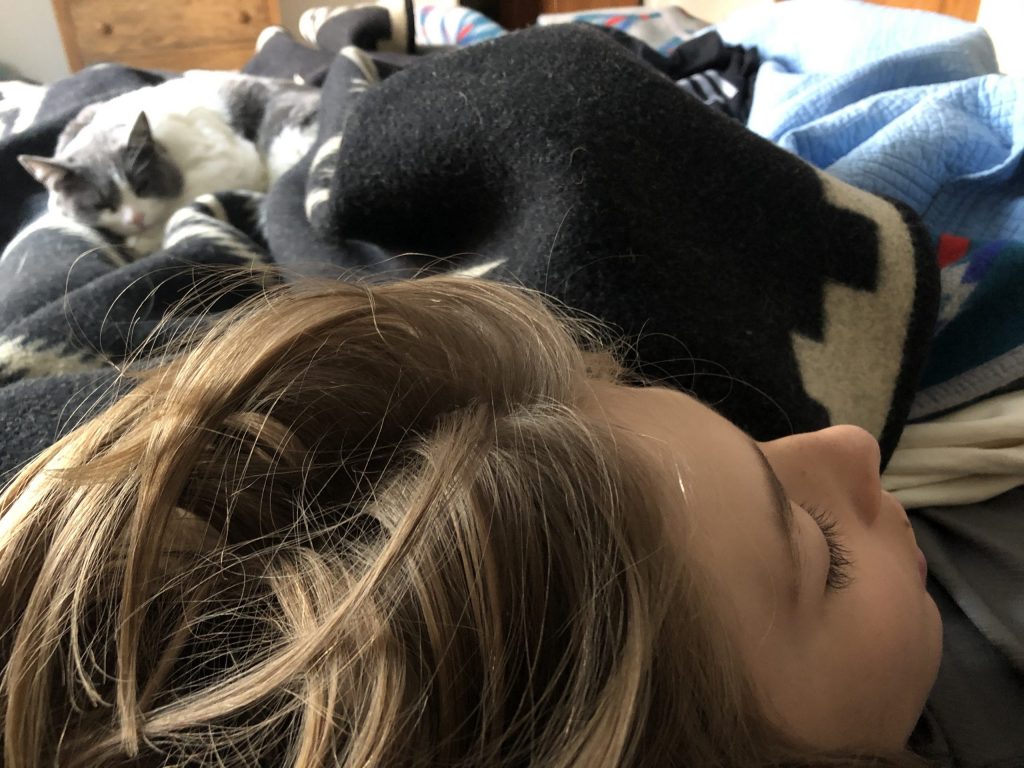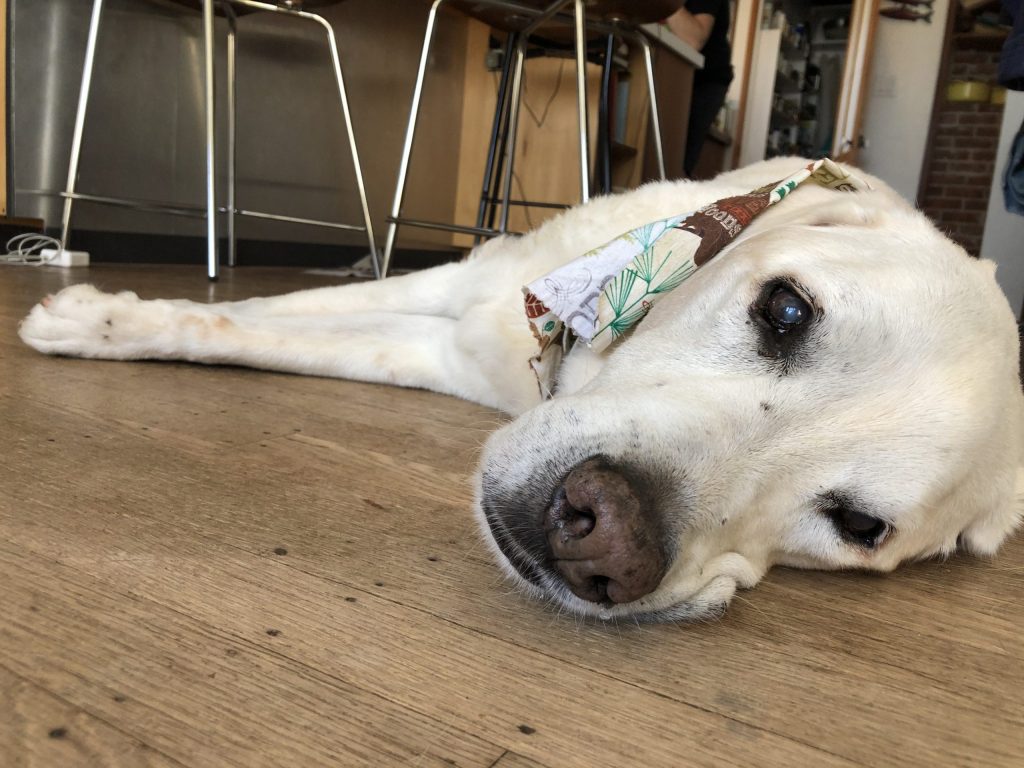The term “anthropomorphizing” gets used in my household a lot. Mostly by my husband who likes to tease me for things like leaving the light on for the goldfish at night when we’re away, or warning against the ill psychological effects of fat-shaming on our corpulent cat. These two examples admittedly are probably worthy of ridicule. The fish, were it wild, would live in darkness for much of its life, and it’s not as if the cat has stopped expanding in response to our mean-girl jokes. Her family nickname was The Fat One, now shortened to The Fat, and to be honest we hardly call her by her given name anymore (which is Neve. It means “snow” in Italian, chosen because she was the only kitten in her litter who had any white on her at all).
Anthropomorphism is defined by the Oxford Learner’s Dictionary as “the practice of treating gods, animals or objects as if they had human qualities.” Since scientists began studying animal behavior, anything that had even a whiff of anthropomorphism about it was instantly discounted as sentimentalism. It’s true that the literary device of assigning certain characteristics to animals (and vice versa) has resulted in devastating misconceptions. Witness the indiscriminate slaughter of wolves as settlers moved from Europe to the Americas, bringing with them grim, puritanical tales of wolves whisking off children, lying and disguising themselves or embodying the devil himself. (A blend of deep scholarship and beautiful writing about this topic is in Barry Lopez’ Of Wolves And Men). But I’d argue that a rigid scientific paradigm of refusing to see animals as capable of thought, feeling and meaningful communication has short-circuited basic observation and, in some cases, common sense or innate understanding.
What dog owner among us can deny the slinking shame of a dog just revealed to have eaten the 100-year-old hand painted Ukranian blown Easter eggs handed down by one’s late father-in-law? (Not that that’s ever happened to me.) The dog is not just reading your body language when you open the door. It likely made for its hidey-hole hours before you had any idea what went on. Or what about the comfort that silently appears at the side of the couch when you’re sitting there, sad or struggling with something? The whiskery chin on the knee, or the cool nose pushed into a hand — the message couldn’t be any clearer if the dog had left you a handwritten note.
 Our current dog Pocket did not eat the eggs (that was before his time). He chews Amato’s LEGO pieces, the TV remotes, my glasses, and the strands of thread poking out of our living room rug. Pocket’s nickname is The Furry Feather because when we first saw him, the white ruff around his neck reminded me of a feather boa. And he is a slender, bird-boned thing, light and incredibly fast. I have had a procession of truly wonderful dogs in my life, but I fell for Pocket with all the control of a middle school crush, and, I like to anthropomorphize, he for me.
Our current dog Pocket did not eat the eggs (that was before his time). He chews Amato’s LEGO pieces, the TV remotes, my glasses, and the strands of thread poking out of our living room rug. Pocket’s nickname is The Furry Feather because when we first saw him, the white ruff around his neck reminded me of a feather boa. And he is a slender, bird-boned thing, light and incredibly fast. I have had a procession of truly wonderful dogs in my life, but I fell for Pocket with all the control of a middle school crush, and, I like to anthropomorphize, he for me.
On this journey, we’ve learned the Feather has that enviable ability to hop in a vehicle, sleep for an hour or a day, and wake up perfectly happy to be wherever he now is. He has zero knowledge of the plan or the intent. He’s just happy, not in a slavish or dim-witted way, but in the way befitting a being with a massive ability to adapt and a wide-open heart. Whatever comes next is not fine – it’s goddamn incredible.
As for the cat. Why on earth did we bring the cat? Because mutiny would’ve erupted before we ever left port. Amato was game for a six-month road trip with us, but not without Neve. We knew she could easily foil the entire plan by mutinying herself once we hit the road — but she hasn’t. She has shrunken her world as necessary and endures the ignominy of #vanlife as any queen would, with a regal annoyance that says #imayyetdecidetoclawyoureyesout.
One more moniker for her: Below The Knee Cat, as she won’t snuggle any higher than the crook of your leg – a preference my husband points to as a perfect illustration of her general disdain of all other lifeforms. I myself find it perfectly understandable. But either way, there’s nothing at all to do about it. The Fat is her own creature.

The greatest joy of having an animal in one’s life is experiencing a connection that is non-human, even if it is only Below The Knee. What is of course assuming, self-centered and self-serving is the idea that if a creature doesn’t communicate or display the way humans do, in a way humans can readily understand, it is somehow of lesser stature or intelligence. Octopuses can change shape and color. They can taste with their skin. They have three hearts and nine brains and can escape enclosures through tiny openings. Are these not superpowers any human would envy with all the might of its large, land-lubbing brain? I believe most animals probably have understandings so deep they bear no outward transmission for human convenience.
Neve purr-chirps when she sees me moving to her food bowl on the bathroom counter. She likes company when she eats. After she’s had a few bites, she purr-chirps again and waits for me to turn on the faucet so she can drink. It’s a thing we do. It gives me such pleasure to make her happy like this, with these tiny conversations. She can ignore me the rest of the day as long as she gives me the purr-chirp I need, just so I know she’s still talking to me even though I’ve trapped her in this RV life without asking her.
The truest communication needs no words or any sound at all. Ecologist Carl Safina writes in his lovely book Beyond Words: What Animals Think And Feel —
Words are at best a loose cargo net of labels that we throw over our wild and woolly perceptions hoping to catch and observe some of our thoughts and feelings … Speech is a slippery grip for measuring thoughts. People might lie. We sometimes ignore what someone is saying and use body language as a more truthful guide to what they’re really feeling. Sometimes words fail us. And the fact that we learn different languages shows that words are rather arbitrary: that authentic thoughts arise first; then we paste words onto them.
Most of us know just what he’s saying.
I’ve held two of my past dogs in my arms as they died and I wouldn’t trade those wrenching moments for anything in my life. Simultaneously too slow and too swift, those moments showed me that true love has no short cuts and very much includes death and all that leads up to it, like a coin necessarily has two faces. No translation was needed between me and my beloveds as they passed on silently. We knew what the other was communicating, innately understanding the coin that tumbles fluidly, face over face, across any designation of species. ≡
This post is lovingly dedicated to the incomparable Buzz, and to the Gomez-Youngs who loved him and told him so every day, with and without words.

I’ve read these books. Maybe you’d like them, too.
How Animals Grieve, Barbara King
Of Wolves And Men, Barry Lopez
Beyond Words: How Animals Think And Feel, Carl Safina
The Soul of an Octopus, Sy Montgomery

